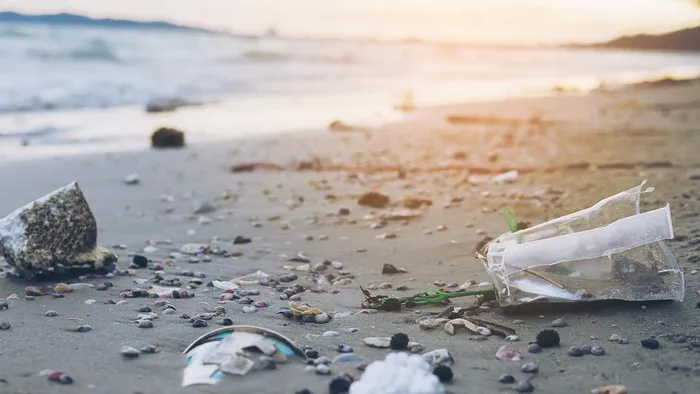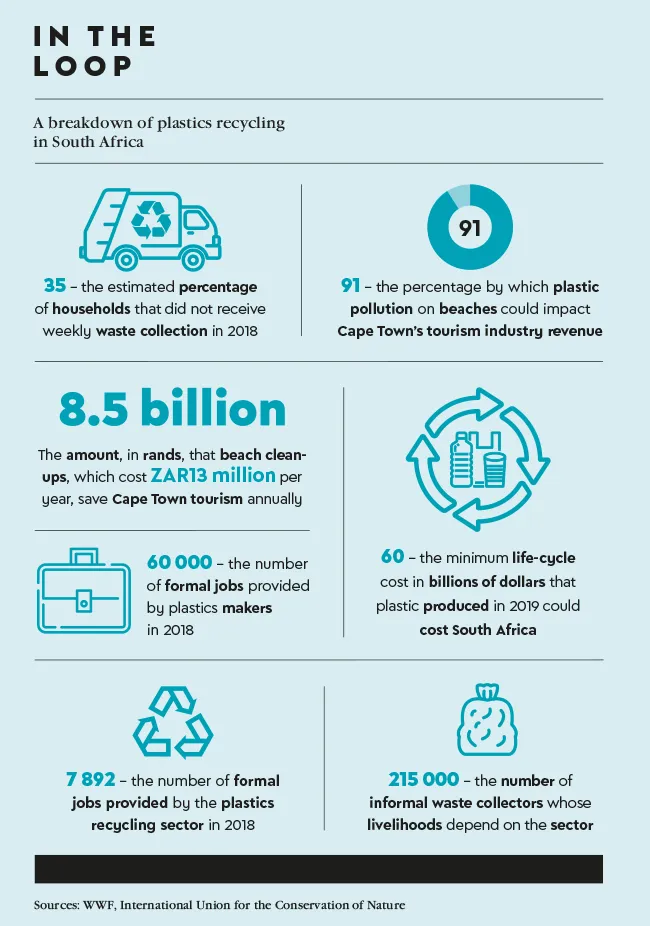
Plastic pollution is a growing crisis.
Image: Freepik
Plastic pollution is choking rivers, poisoning oceans, and infiltrating food chains, and the numbers are staggering.
At the heart of the current issue are microbeads: tiny solid plastic particles smaller than five millimetres found in cosmetics, personal-care products, pesticides, toiletries, and other items.
Global plastic production has ballooned from two million tonnes in 1950 to 475 million tonnes in 2022.
Without urgent intervention, South Africa’s plastic pollution is expected to nearly double by 2040 compared to 2020 levels.
While the plastics industry supports around 60 000 formal jobs in South Africa, it also sustains thousands more informal livelihoods.
In 2023, the informal sector created about 95 900 income-generating opportunities, including waste pickers and small collectors, according to Plastics SA.
But the human cost of plastic waste, from polluted communities to lost tourism income and damage to marine life, is mounting.

Just how much damage does plastic pollution do?
Image: WWF | International Union for the Conservation of Nature
Two months ago, South Africa voiced its disappointment after the Intergovernmental Negotiating Committee session in Geneva.
This sought to deliver a binding global treaty on plastic pollution, ended without agreement.
The talks collapsed amid deep divisions between nations and the absence of a clear process to resolve the deadlock.
Government described the outcome as a setback and expressed concern about the procedural failings that stalled progress.
Despite the international impasse, South Africa has been stepping up its domestic fight.
The country already has a Plastics Pact, under which members including Spar, Unilever, Pick n Pay, and Sasol have committed to four ambitious 2025 targets designed to tackle different components of the plastic packaging value chain.
Collectively, these goals aim to push South Africa closer to a functional circular economy for plastic packaging.
Building on that momentum, government recently launched the Plastic Reboot Project: Circular Solutions for Plastic Pollution in South Africa. The UN Industrial Development Organisation (UNIDO) called this “a pioneering effort to reduce plastic waste at its source”.
The multi-year project seeks to transform how plastic is designed, used, and managed across the entire packaging value chain.
This project aims for a systems-level shift in South Africa’s plastics value chain, contributing to a thriving, equitable, and inclusive circular economy for packaging and short-lived plastic products in the food and beverage sector.
It focuses on the upstream and midstream stages of the lifecycle, where waste can be prevented, reduced, or product life extended.
Funded by the Global Environment Facility (GEF), the Plastic Reboot Project is implemented internationally by UNIDO.
In South Africa, the Department of Forestry, Fisheries and the Environment (DFFE) serves as the national focal point, with WWF South Africa as the executing agency, supported by the Council for Scientific and Industrial Research and GreenCape.
“Plastic pollution is not just a waste problem. It’s a design, systems, and equity challenge,” said Lorren de Kock, senior technical specialist at WWF South Africa.
As the world moves towards a circular future, the Plastic Reboot Project positions South Africa at the forefront of circular innovation in plastics, proving that with the right strategies and partnerships, sustainable solutions are not only possible, but within reach,” De Kock added.
In a parallel push, DFFE Minister Dr Dion George in August 2025 published draft regulations to prohibit the production, distribution, sale, import, and export of plastic microbeads and products containing them, marking a significant stride in the country’s war against plastic pollution.
The regulations seek to eliminate plastic microbeads.
Once enacted, they will impose a blanket ban, backed by provisions for monitoring, evaluation, and strict penalties for non-compliance, including fines of up to R10 million or imprisonment for up to 20 years for repeat offenders.
“Plastic microbeads may be small, but their impact on our oceans and wildlife is immense. By banning them, we are not only preserving biodiversity but also ensuring a healthier future for generations to come,” said George.
From policy to enforcement, South Africa is intensifying its campaign to curb plastic pollution – taking concrete steps that may help turn the tide on one of the planet’s most pervasive environmental threats.
IOL Business
Related Topics: